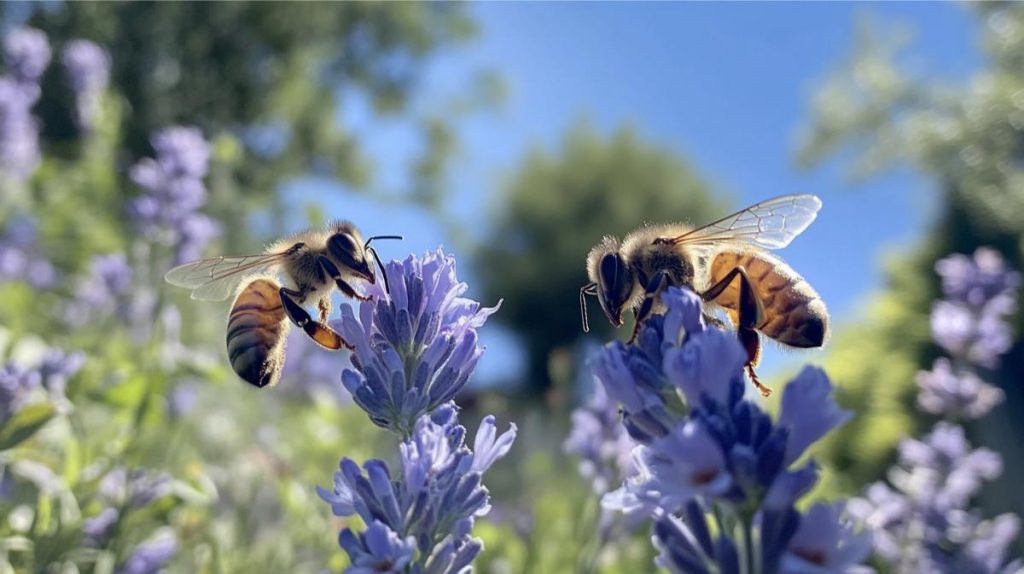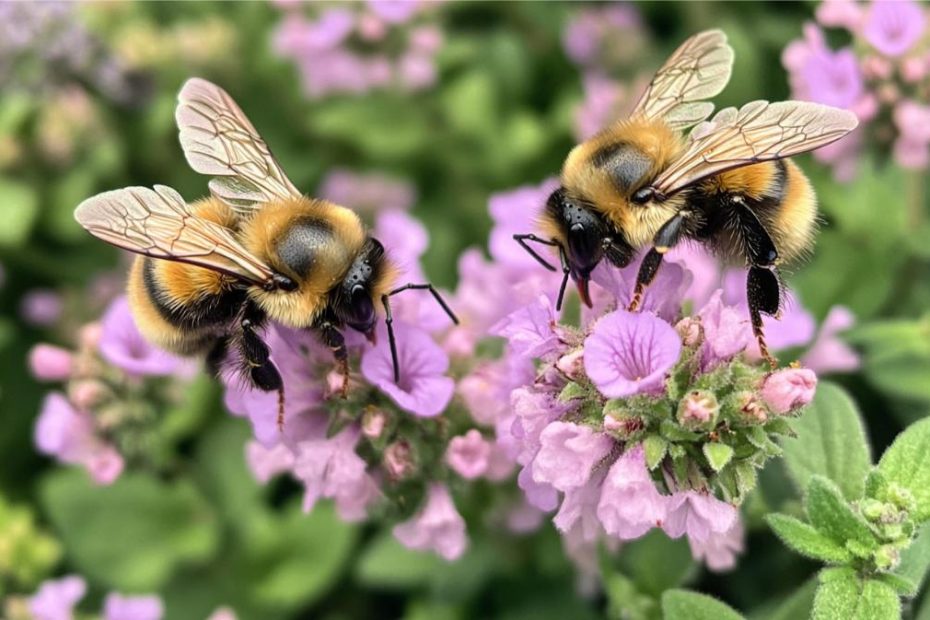Imagine a world without bees. No buzz in your garden, no honey for your tea, and much less food on your plate.
Bees are tiny heroes that keep our planet thriving. These fuzzy flyers help produce one-third of our food supply. They also play a crucial role in maintaining biodiversity.
You might think bees just make honey, but they’re so much more. They’re nature’s matchmakers, helping plants reproduce by moving pollen from flower to flower.
This process is vital for many fruits, vegetables, and nuts you enjoy daily. Without bees, your salads would be a lot less colorful and tasty!
But here’s the sting – bees are in trouble. Their numbers are dropping due to pesticides, habitat loss, and climate change.
The good news? You can help! By making small changes in your daily life, you can become a bee’s best friend and help protect these essential insects.
Key Takeaways
- Bees are vital for food production and ecosystem health
- These pollinators face threats from human activities and environmental changes
- You can take simple actions to help protect bees and support their populations
The Buzz on Bees and Ecosystem Services
Bees are nature’s tiny heroes, buzzing around and making our world a better place. These hard-working insects provide crucial services that keep our ecosystems thriving and our dinner plates full.
Pollinating Powerhouses: Bees at Work

Did you know that bees are responsible for pollinating about one-third of the food you eat? These busy little workers are the unsung heroes of your grocery store.
As bees flit from flower to flower, they’re not just sipping nectar – they’re playing matchmaker for plants. They spread pollen, helping plants reproduce and create the fruits and veggies you love.
Without bees, your salad would look pretty sad. Imagine saying goodbye to juicy strawberries, crunchy almonds, and creamy avocados. Yikes!
Biodiversity and Bees: A Blooming Relationship
Bees aren’t just about keeping your plate colorful – they’re vital for maintaining the planet’s biodiversity. These tiny pollinators help wild plants thrive, creating lush habitats for other wildlife.
Think of bees as nature’s gardeners. They help:
- Maintain diverse plant species
- Support food chains
- Keep ecosystems in balance
Without bees, many plant species would struggle to survive. This could lead to a domino effect, impacting everything from birds to bears.
So next time you see a bee, give it a little mental high-five for keeping our world diverse and beautiful!
Honey, I’m Home: The Hive’s Role in the Ecosystem
Bees aren’t just busy outside the hive – their home life is pretty important too! Honeybees produce that sweet, golden treat you love to drizzle on your toast. But honey is more than just a tasty snack.
Bees also create:
- Beeswax (great for candles and natural cosmetics)
- Propolis (a natural antibiotic)
- Royal jelly (a nutrient-rich superfood)
These hive products contribute to both human wellbeing and ecosystem health. Plus, bee colonies serve as food sources for other animals. It’s a sweet deal for everyone involved!
Protecting Our Fuzzy Friends and Our Future

Bees face many threats, but there’s hope. You can make a difference in saving these crucial pollinators.
Let’s find out how to combat harmful practices, support conservation, and take action in your own backyard.
Stemming the Sting: Combating Pesticides and Pollution
Pesticides, especially neonicotinoids, are a major threat to bees. These chemicals weaken bees’ immune systems and mess with their navigation skills. Yikes!
You can help by:
- Choosing organic produce
- Avoiding pesticides in your garden
- Supporting farms that use natural pest control
Air pollution is another buzzkill for bees. It messes with their ability to find flowers. You can reduce your carbon footprint by:
- Walking or biking more
- Using public transport
- Switching to renewable energy
Climate change is making life tough for bees too. Planting native flowers that bloom at different times can give bees a helping hand as seasons shift.
Building Buzz: Conservation Efforts and Beekeeping
Bee conservation efforts are creating quite a buzz! Organizations are working to protect bee habitats and promote bee-friendly farming practices.
You can join the hive mind by:
- Supporting local conservation groups
- Volunteering for habitat restoration projects
- Celebrating World Bee Day on May 20th
Beekeeping is another sweet way to help. It supports both honeybees and wild bee populations.
If you’re feeling adventurous, consider starting your own hive. Don’t worry, your local beekeeper’s association can help you get started.
Landing on Solutions: How You Can Save the Bees
Ready to bee the change? Here are some simple ways you can help:
- Plant a bee-friendly garden with native flowers
- Provide a water source for thirsty bees
- Buy local honey to support beekeepers
- Avoid using pesticides in your yard
- Leave some bare soil for ground-nesting bees
You can also spread the word about bee conservation. Share fun bee facts with your friends or host a bee-themed movie night.
The more people know, the more they can help!
Remember, every little bit counts. By taking these steps, you’re not just helping bees – you’re supporting global food security and biodiversity. Now that’s something to buzz about!
